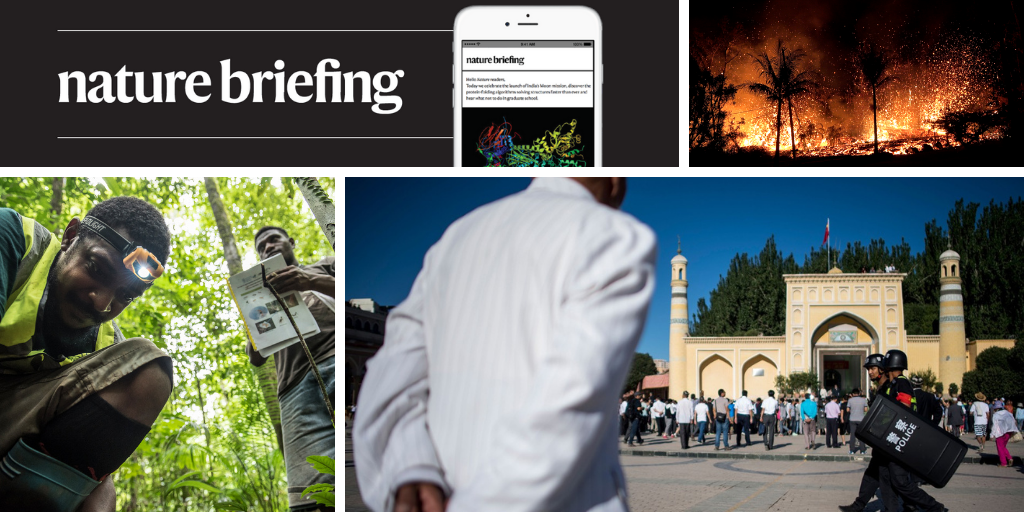Daily briefing: how to avoid arguments over authorship
- Select a language for the TTS:
- UK English Female
- UK English Male
- US English Female
- US English Male
- Australian Female
- Australian Male
- Language selected: (auto detect) - EN

Play all audios:

Hello _Nature_ readers, would you like to get this Briefing in your inbox free every day? Sign up here MALE DNA DATABASE FACES ETHICAL CHALLENGES A huge database of Y-chromosome profiles has
expanded from a research resource to a key tool for justice systems. But some European geneticists say that the Y-chromosome Haplotype Reference Database (YHRD) has an ethics problem.
Thousands of profiles in it were obtained from men who are unlikely to have given free, informed consent. These include data from persecuted minority groups, such as the Uyghurs in China and
the Roma in eastern Europe. Nature | 10 min read PAPERS IN CLOSED JOURNALS GET FEWER CITATIONS Papers published in a now-defunct business journal get 20% fewer citations than do similar
articles in titles that are still running, according to an analysis of finance articles. The study is among the first to investigate the effects of closing a leading journal and hint at the
importance of journal prestige for researchers referencing others’ work. The study is a “provocative contribution” to our understanding of how scientists work, says social scientist Flaminio
Squazzoni. The title in question was discontinued for administrative reasons and officially closed in 2006. Nature | 4 min read Reference: _Journal of Political Economy_ paper VIDEO:
LESSONS FROM KILAUEA In 2018, Hawaii's most active volcano took scientists by surprise. Lava started spewing out not from the summit, but 50 kilometres away on the lower slopes of the
volcano. This unexpected eruption destroyed farms, roads and more than 700 homes. A _Nature_ video explores how volcanologists have been piecing together the events that triggered the
unexpected eruption to try and better predict future hazards. Nature | 7 min video Reference: _Nature Communications _paper FEATURES & OPINION HOW TO AVOID AUTHORSHIP ARGUMENTS
Authorship disputes are rife. _Nature_ speaks to researchers, publishers and funders about formative collaborations that saw career-defining contributions to papers downplayed, and describes
steps that researchers can take to mitigate tensions that might arise in collaborations. One suggestion is to have a scientific ‘pre-nup’, or team charter, that spells out roles,
responsibilities and processes for conflict resolution in advance. Nature | 12 min read PRIDE IN GEOSCIENCE The geosciences are among the least diverse of all science disciplines: ethnic,
racial and gender representation is poor, notes a _Nature Reviews Earth & Environment_ editorial. For LGBT+ scientists — those from sexual and gender minorities — the challenges faced
include those associated with fieldwork: a survey of LGBT+ geoscientists found that a third had declined fieldwork opportunities owing to safety concerns. In celebration of Pride month, the
journal has published a series of personal reflections and thoughts on some of the challenges faced by LGBT+ geoscientists. Nature Reviews Earth & Environment | 4 World View articles and
an editorial A SCATTER OF LIFE AND DEATH The first graph in history might have been a one-dimensional plot showing the wildly inaccurate estimates of the distance from Toledo, Spain, to
Rome, drawn by map-maker Michael Florent van Langren in 1628. This extraordinary conceptual leap highlighted the danger that cartographic failures could pose to travellers. From train
schedules to blood-glucose levels, graphs have proliferated in spectacular fashion to visualize data in a way that helps to save lives, writes mathematician Hannah Fry. The New Yorker | 15
min read WHERE I WORK “It takes collaboration to get the full picture of a forest,” says ecologist Jason Paliau. Here, he works with a local secondary-school student named Sammy to measure
the impact of mining and logging on the rainforests of Papua New Guinea. Paliau, who grew up in the northern city of Lae, says that local people contribute essential expertise gained from a
lifetime of living on the land. (Nature | 3 min read)